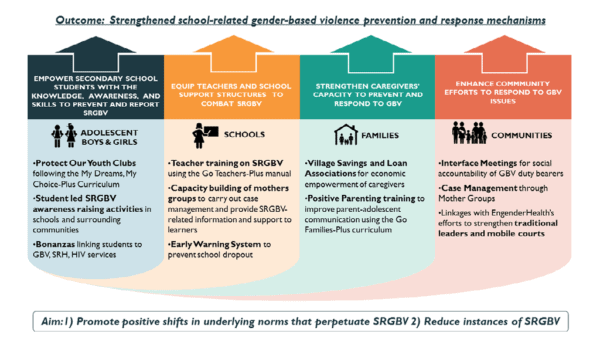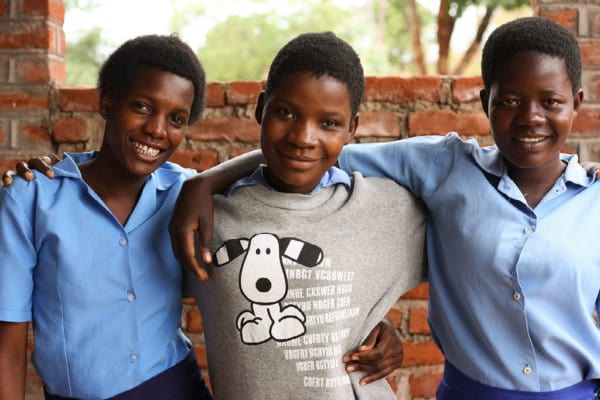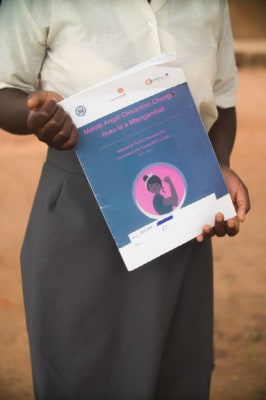Reducing School-Related
Gender-Based Violence in Malawi
The Bantwana Initiave of World Education, Inc.
The Bantwana Initiave of World Education, Inc.
School-related gender-based violence (SRGBV) affects millions of children around the world and contributes to higher rates of educational underachievement and school dropout for girls. To address high rates of SRGBV in Malawi, the Bantwana Initiative of World Education—through EngenderHealth’s Essential Gender-Based Violence (GBV) Services and Prevention Project, funded by the US Department of State Secretariat for Global Women’s Initiatives (S/GWI)—launched an integrated and comprehensive approach to strengthen SRGBV prevention and response mechanisms.

WEI/Bantwana launched Protect Our Youth Clubs in 43 community day secondary schools in Blantyre, Chiradzulu, Kasungu and Mzimba Districts. The clubs aim to help prevent and reduce SRGBV through protective asset building, life skills and adolescent sexual and reproductive health (ASRH) information, and by addressing gender norms and power relationships that contribute to unwanted pregnancy and early marriage.


POY clubs play a catalytic role in empowering students to better respond to and prevent SRGBV in a way that promotes gender equality and provides an alternative lens through which they can challenge the rigid and harmful gender norms that perpetuate GBV and SRGBV. POY clubs activate autonomy and agency, and support girls’ life aspirations. The clubs also add value in understanding how better to support adolescent boys and girls as they explore pathways to minimize their risk of SRGBV in the future.
Teachers are trained to act as matrons/patrons of POY clubs, and deliver the World Education/Bantwana-developed My Dreams, My Choice Plus curriculum during club sessions. Through this curriculum, students are empowered to work collaboratively; to speak out and take action against inequality, social injustice, abuse, examine unequal power dynamics and challenge gender norms that discriminate against girls and perpetuate GBV
School bonanzas are an innovation designed to improve response mechanisms to SRGBV and facilitate linkages to services.


Bonanzas are one-stop-shop events that provide on-the-spot linkages to medical, legal, and counselling support for survivors. Bonanzas bring together local GBV service providers who hold informational sessions, as well as conduct individual consultations and immediate service provision. Additionally, Mother Groups trained in case management, GBV response, and psycho-social support are linked with bonanza service providers to ensure continuous referrals to services for victims of abuse.
It is usually very difficult [for learners] to have the vigor of visiting the services at the facilities due to the number of misconceptions. At their age and being unmarried, it would be questionable to most of the members of the community for them to have been found accessing services. Even their parents could not understand, but now that it [services] start from the schools, parents will easily understand and tolerate it. They [the learners] now know where to access justice, health and other social services. They now know where to go when they encounter abuse. The bonanzas have played a crucial role in their lives. – Mercy Kishombe, Officer of the Court
Interface meetings with duty bearers are platforms where students constructively engage with service providers, traditional and faith leaders, and local government to hold them accountable for their conduct and performance to deliver services, improve community welfare, and protect children’s rights
Accountability is critical in sustainably preventing GBV and improving reporting and help seeking behaviour from survivors of GBV.
Caregiver village savings and loan associations (VLSAs) intervene at the family level to strengthen caregivers’ financial resilience, and capacity and commitment to prevent and respond to GBV.
VSLAs are self-selected groups of community members who meet weekly to collect savings contributions and issue micro-loans. Trained Economic Empowerment Volunteers facilitate the weekly sessions and support members to set and work towards achievable goals.
VSLAs help to address the economic drivers of GBV by encouraging savings while building financial literacy and small business skills and strengthening social support systems. WEI/Bantwana also uses VSLA+ as platforms to further layer positive parenting training for caregivers that covers topics such as communicating with adolescents about sexual and reproductive health, relationships, HIV, and violence prevention.
“Through the VSLA, I borrowed money and started my own small business. The business is the one that is supporting my family. Prior to this project, I had failed to raise the capital needed to start the business. I breed and sell chickens within the community.” – VSLA Caregiver